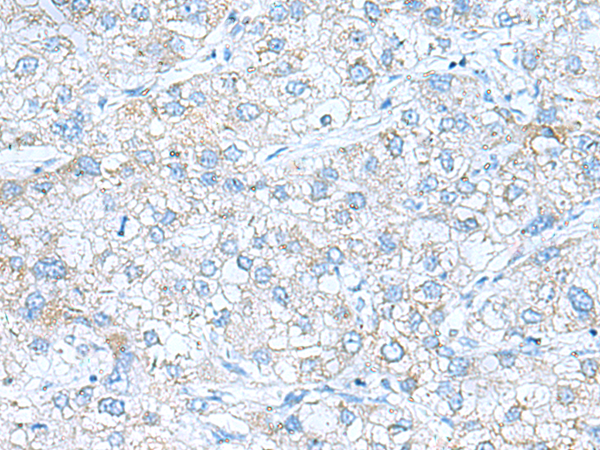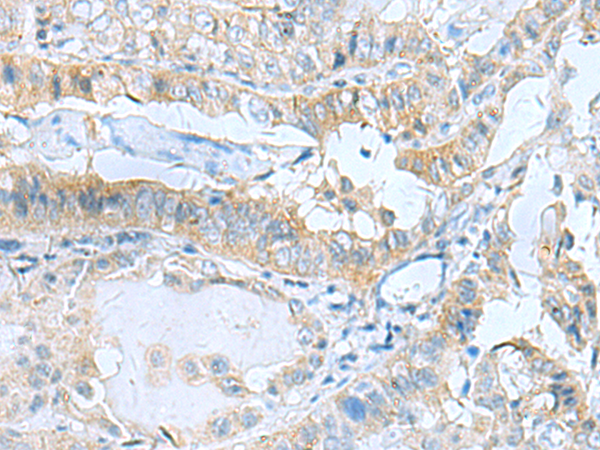

| WB | 咨询技术 | Human,Mouse,Rat |
| IF | 咨询技术 | Human,Mouse,Rat |
| IHC | 1/25-1/50 | Human,Mouse,Rat |
| ICC | 技术咨询 | Human,Mouse,Rat |
| FCM | 咨询技术 | Human,Mouse,Rat |
| Elisa | 1/1000-1/2000 | Human,Mouse,Rat |
| Aliases | ASIC; ACCN2; BNaC2 |
| Host/Isotype | Rabbit IgG |
| Antibody Type | Primary antibody |
| Storage | Store at 4°C short term. Aliquot and store at -20°C long term. Avoid freeze/thaw cycles. |
| Species Reactivity | Human, Mouse, Rat |
| Immunogen | Synthetic peptide of human ASIC1 |
| Formulation | Purified antibody in PBS with 0.05% sodium azide and 50% glycerol. |
+ +
以下是3篇与ASIC1抗体相关的代表性文献,按主题分类简要说明:
---
**1. 文献名称**:*Characterization of a polyclonal antibody against the ASIC1a subunit*
**作者**:Wemmie, J.A. et al.
**摘要**:研究报道了一种针对ASIC1a亚基的多克隆抗体的开发与验证,证实其能特异性识别大鼠和小鼠脑组织中的ASIC1a蛋白,并应用于免疫组化及Western blot检测,揭示了ASIC1a在中枢神经系统的广泛分布。
---
**2. 文献名称**:*ASIC1 Antibody Attenuates Ischemic Stroke Injury by Inhibiting Neuroinflammation*
**作者**:Xiong, Z.G. et al.
**摘要**:通过使用ASIC1特异性抗体阻断通道功能,研究证明其可减少缺血性脑损伤中的神经元凋亡和炎症反应,提示ASIC1抗体在神经保护治疗中的潜在应用价值。
---
**3. 文献名称**:*Selective targeting of ASIC1 using monoclonal antibodies modulates nociception in vivo*
**作者**:Delaunay, A. et al.
**摘要**:开发了一种针对ASIC1的单克隆抗体,在动物模型中验证其可特异性抑制酸诱导的疼痛信号传递,为慢性疼痛的抗体疗法提供了实验依据。
---
**可选补充**:
**4. 文献名称**:*Validation of commercial ASIC1 antibodies for human tissue studies*
**作者**:Smith, E.S.J. et al.
**摘要**:系统评估了市售ASIC1抗体的特异性,发现部分抗体存在交叉反应问题,强调在人类组织研究中选择经过验证的抗体的重要性。
---
以上文献涵盖抗体开发、功能验证及疾病应用方向,如需具体文章年份或期刊可进一步补充。
Acid-sensing ion channel 1 (ASIC1) is a proton-gated cation channel belonging to the DEG/ENaC superfamily, primarily expressed in the central and peripheral nervous systems. It plays a critical role in detecting extracellular acidification, a hallmark of ischemic stroke, inflammation, and tissue injury. ASIC1 exists as two splice variants (ASIC1a and ASIC1b) with distinct tissue distributions and pH sensitivities. ASIC1a, the dominant isoform in the brain, is permeable to Ca²⁺ and contributes to acidosis-mediated neuronal damage, synaptic plasticity, and pain perception.
ASIC1 antibodies are essential tools for studying the channel’s expression, localization, and function. They enable detection of ASIC1 proteins in Western blotting, immunohistochemistry, and immunofluorescence, aiding research on its role in neurological disorders (e.g., stroke, epilepsy) and chronic pain. Specific antibodies targeting extracellular or intracellular epitopes help differentiate between isoforms and assess post-translational modifications. Studies using ASIC1 antibodies have revealed its upregulation in pathological conditions, such as neuroinflammation and neurodegeneration, highlighting its therapeutic potential. Inhibitors or modulators targeting ASIC1. validated using these antibodies, are explored for treating ischemic brain injury and inflammatory pain. However, challenges remain in ensuring antibody specificity due to structural similarities among ASIC subunits. Overall, ASIC1 antibodies are pivotal in advancing understanding of pH-sensitive signaling mechanisms and their pathophysiological implications.
×